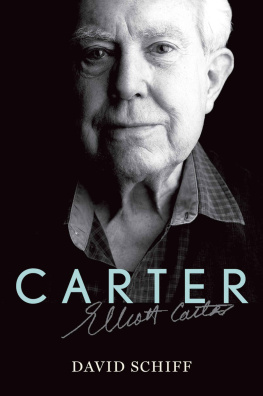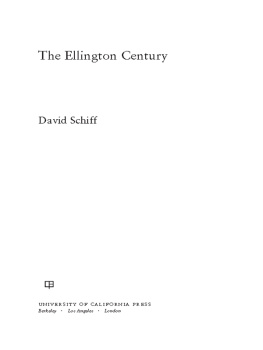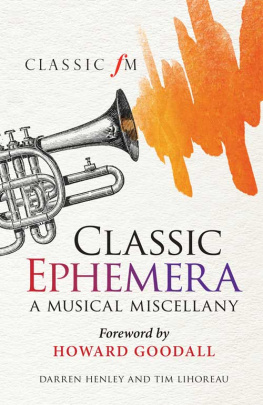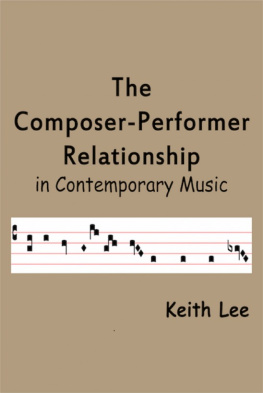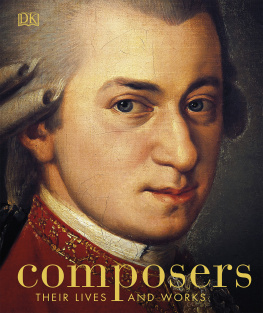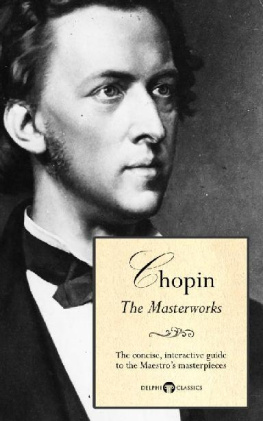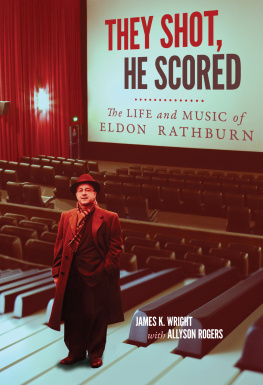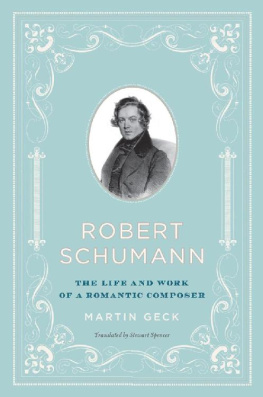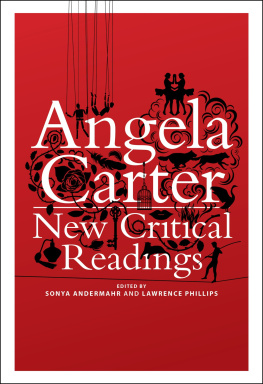
CARTER
SERIES EDITED BY R. LARRY TODD
FORMER SERIES EDITOR, THE LATE STANLEY SADIE
T H E M A S T E R M U S I C I A N S
| Titles Available |
| Bach Malcolm Boyd | Mendelssohn Philip Radcliffe |
| Beethoven Barry Cooper | Monteverdi Dennis Arnold |
| Berlioz Hugh Macdonald | Mozart Julian Rushton |
| Brahms Malcolm MacDonald | Mussorgsky David Brown |
| Byrd Kerry McCarthy | Puccini Julian Budden |
| Carter David Schiff | Rossini Richard Osborne |
| Chopin Jim Samson | Schoenberg Malcolm MacDonald |
| Debussy Eric Frederick Jensen | Schumann Erik Frederick Jensen |
| Handel Donald Burrows | Tchaikovsky Roland John Wiley |
| Liszt Derek Watson | Verdi Julian Budden |
| MacDowell E. Douglas Bomberger | Vivaldi Michael Talbot |
| Mahler Michael Kennedy |

CARTER

DAVID SCHIFF


Oxford University Press is a department of the University of Oxford. It furthers the Universitys objective of excellence in research, scholarship, and education by publishing worldwide. Oxford is a registered trade mark of Oxford University Press in the UK and certain other countries.
Published in the United States of America by Oxford University Press
198 Madison Avenue, New York, NY 10016, United States of America.
Oxford University Press 2018
All rights reserved. No part of this publication may be reproduced, stored in a retrieval system, or transmitted, in any form or by any means, without the prior permission in writing of Oxford University Press, or as expressly permitted by law, by license, or under terms agreed with the appropriate reproduction rights organization. Inquiries concerning reproduction outside the scope of the above should be sent to the Rights Department, Oxford University Press, at the address above.
You must not circulate this work in any other form and you must impose this same condition on any acquirer.
Library of Congress Cataloging-in-Publication Data
Title: Carter / David Schiff.
Description: New York, NY : Oxford University Press, [2018] |
Series: Master musicians series |
Includes bibliographical references and index.
Identifiers: LCCN 2017026769|
ISBN 9780190259150 (hardcover : alk. paper) | ISBN 9780190259174 (epub)
Subjects: LCSH: Carter, Elliott, 1908-2012.
| ComposersUnited StatesBiography. | Carter, Elliott, 19082012
Criticism and interpretation.
Classification: LCC ML410.C3293 S32 2018 | DDC 780.92 [B]dc23
LC record available at https://lccn.loc.gov/2017026769
To Judy
Contents
T HIS IS MY THIRD BOOK ABOUT ELLIOTT Carters music. The changing perspective in these three volumes reflects the expansion of Carters oeuvre over the last third of his life, my own development as a composer and writer, and many changes in the musical landscape worldwide.
I began work on The Music of Elliott Carter, published in 1983 by Eulenberg Books and Da Capo Press (MEC83 from now on), in 1978 when I was studying with Carter at the Juilliard School. At that time he had deposited most of his sketches at the Library for the Performing Arts at Lincoln Center, a branch of the New York Public Library, just a short walk from Juilliard and from my apartment. Although I hoped to keep the book accessible to the general reader, I included detailed technical information on every work Carter had composed, based on the material at the library and on our many conversations at lessons, rehearsals, and performances. While I gave a thorough account of the early, pre-Carter works in MEC83, my emphasis was on the mature oeuvre, which began, as it seemed at the time, with the Cello Sonata, completed on Carters fortieth birthday. Intending to convey in detail Carters own understanding of his development as a composer, I analyzed the music in accordance with his suggestions, and I used his idiosyncratic technical vocabulary (i.e., chords rather than pitch class sets). Carter read and corrected several drafts of the book (as did Charles Rosen and William Glock). Recently, in reading through his correspondence at the Paul Sacher Stiftung, I discovered that Carter habitually recommended my book to friends and institutions as a source of information about his music. When certain music theorists, led by Andrew Mead, criticized the technical discussion in the book, and my competence as a theorist, Carter defended my work vigorously, saying that I had accurately presented his own view of his music.
I began work on a second edition of MEC in 1996, while on a full-year sabbatical leave from my teaching position at Reed College. Faber Books and Cornell University Press published this second edition in 1998. Because Carter had turned out so much music after the time I completed the first edition, I extensively rewrote and rearranged the existing material to make room for the new works. Because of these substantial changes, I consider MEC98 a distinct work, not just an updated revision. As I noted in the preface to MEC98, its more restrained tone sprang from my dissatisfaction with the style of MEC83, not from any change in my feelings about the music, but in writing the second edition I was also dealing with some important changes in Carters oeuvre. Beginning in 1983, he supplemented his pursuit of long form composition with a series of shorter works. Many features of the miniatures would become the basis for his late period works, both short and long, from the mid-1990s onward. In refashioning MEC I strove to understand the relation between these two modalities, again through a close study of Carters extensive sketches. Access to all the new sketch material was now more of a logistical challenge because in 1980 I moved to Portland, Oregon, and in 1988 the Paul Sacher Stiftung in Basel, Switzerland (hereafter PSS) acquired most of Carters scores, sketches, and letters. (There is also a large collection of Carteriana at the Library of Congress.) Thanks to my time at the PSS in the spring of 1997, and considerable assistance from the staff there, I was able to extend my detailed technical discussion to his latest music based on the evidence of his sketches.
To prepare for writing this third study I returned to Basel twice, thanks to support from the Amphion Foundation, Reed College, and the PSS. In addition to studying sketches and manuscript scores for the many works Carter wrote after 1998, I spent much time reading through the large collection (10,000 letters) of Carters correspondence in the PSS. Given the size of this collection, there is much more work for scholars to do in using it to get a better understanding of all aspects of Carters life from 1935 onward. Even with the short time I had with the collection, I found many documents that revealed opinions and connections that do not appear in the published literature.
Next page
